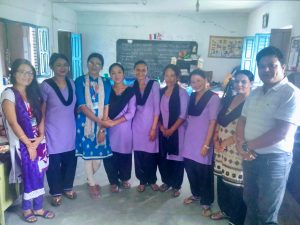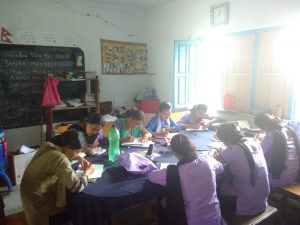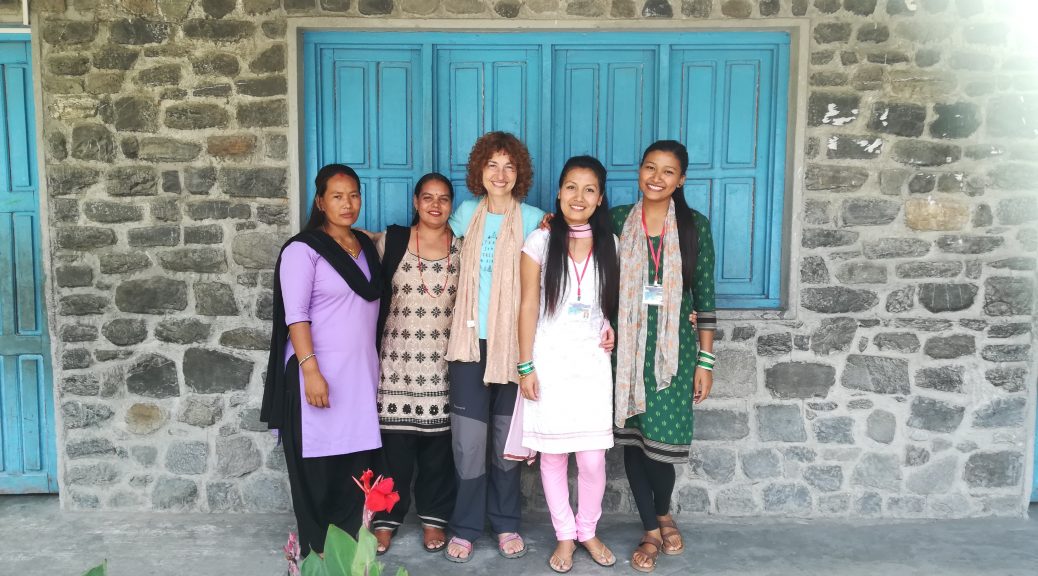Written by Pilar Puigdomènech exvolunteer from the school of Bhimphedi
It was going to be a very short volunteering, 4 weeks in July, too short perhaps? Definitely!!! My son Adrià and I got to Bhimpedhi and knowing we were there fleetingly, settled in our room and got to meet the kids, Surendra, the Didis, the teachers of the boarding school and the other volunteers straight away… and for 21 days we went to our rooms just to sleep. What a wonder!!!!
Journeys were long and light at the same time, from early morning, half past six, to late evening, 9 o´clock… You may wonder why children in the orphanage get up so early… the answer, unbelievable to our European way of living is simple: to study. Children in Balmandir study for an hour and a half in the morning, after having a glass of milk and before breakfast and for another hour and a half in the evening, after their dinner… and this is not the most shocking fact. Despite having been told in advance, it is quite striking to see young children memorizing their lessons by heart, all their lessons, from all subjects. And as they attend a school in which all subjects are taught in English, it is easy for any volunteer to end up, reciting
their lessons too…

I can still hear their voices, their Nepali accents and their singsong. By the way, I haven’t said that children in Balmandir are happy and cheerful kids, and remembering Balmandir is a children’s home, it is more than clear that Amics de Nepal is doing an excellent job there. I wish we had that sort of kids filling up our classrooms, strong and healthy, both physically and psychologically.
I must admit that as a European teacher used to pedagogies which undervalue memorising any sort of information, during their study time, I insisted on making questions related to what they were memorizing to make sure they understood what they were repeating. I soon learned what I now see as obvious; kids who had trouble in memorizing were the same who couldn’t answer the questions testing their comprehension, so helping them to understand what they had to memorize was a very effective way to give them a hand; seen from the distance, it is blatant again!
One of the reasons why we had been accepted as volunteers for such a short period of time was that Amics de Nepal realised the importance of helping teachers at the boarding school improve their English and I have a long experience as a teacher of English as a second language. Except for the subject of Nepali language, the rest of subjects are taught in English, so one may assume that the teachers have an advanced level of English, reasonable at least!
Well, I’m afraid that in the boarding school in Bhimpedhi, this is not always the case, and from what I learned, a lot of the teachers working in the different rural boarding schools throughout
Nepal, are in the same situation. So, how do they manage? It is not difficult to guess, they do exactly the same as they ask their pupils to do, repeat what is in their books…. Welcome to the Boarding School in Bhimpedhi.

Traditionally, a boarding school provides education as well as lodging and meals. However, in Nepal, boarding schools are those which use English as the language of instruction. Are they called boarding because they are supposed to be and Elite educational option? I still wonder. Teaching English to the teachers of the school was a privilege, one of the nicest you can experience. A group of young teachers with different levels of English and interests but all
willing to learn. It was far too short, at least for me. I would have enjoyed staying longer and seeing their progress go forward.
I remember so many unforgettable moments… One day while practising ways to give advice and instructions I asked them to imagine that their soul had gone far away on holiday, to the
nicest place they could think of, and my soul had set into their bodies, to cover up. They had to give me instructions on what to do at home so that nobody would notice anything weird was
going on. I told them to talk directly to me and tell me how to behave with their husbands, kids, parents, neighbours. I gave them a few silly examples like: when you wake up, say hello to
my husband and give him a good morning kiss; you mustn’t drink milk as I never do, you should wake my children up once breakfast is ready. I told them, they could make up whatever
they wanted and that the important was to have fun and enjoy while they were writing… I still remember the way they looked at me. It took me a few minutes to make myself understood, but once they started, it was magic! They enjoyed and I amused myself seeing their sparkling eyes and hearing their giggling. I expected some entertaining, carefree essays, but, once again, I was wrong. What they wrote was, in general, far more intimate than I could have ever
imagined, talking about the relationships with their husbands and kids, their feelings, their desires, their hopes… and, as you can imagine, they all wished me to do my best to enjoy my day in their bodies and take care of their beloved ones.
A pleasure to meet them all and to know that shortly after my departure a young English teacher was going there for a much longer period of time. My son and I will always be grateful to the children in Balmandir, Sir Surendra, the Didis, the teachers, Josep, Joan and the rest of the volunteers and to Amics de Nepal for allowing us to take part in such an admirable project.
